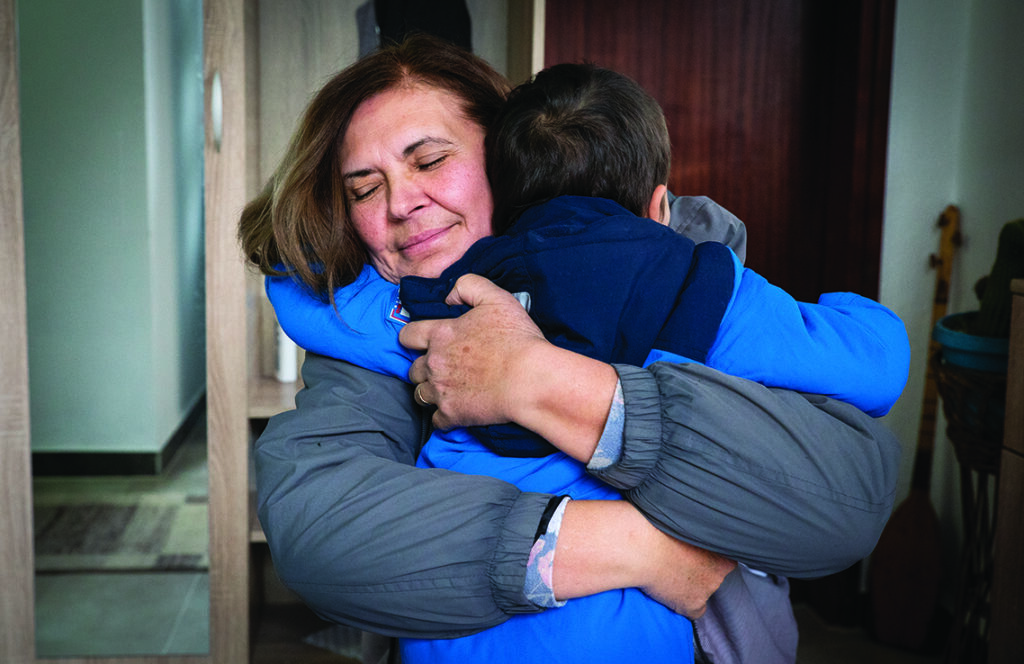Hope and Homes for Children’s social workers are remarkable people. On the ground, in the countries where we work, they are the ones who carry out the hard and complicated task of closing orphanages by finding safe and loving families for children.
At the same time, they work tirelessly to stop new children entering the orphanage system by giving vulnerable families the support they need to stay together. Amra Viteskic is a member of our social work team in Bosnia & Herzegovina, and this is her story.
I’m a kid who grew up in war. I was eight years old when the fighting started here and I remember very well what it meant, not to have the things you need when you are a child.
My parents tried to provide me and my sister with everything they could but during those years, no one had anything. It meant so much to me when I got a Red Cross package or some other kind of help from outside.
From early childhood, I knew that in life I wanted to be someone who would help others, who with one small thing might be able to brighten someone’s day, maybe their year or even their life.
My role today is to support children and families. To help them with advice and guidance or just by listening, to get the most out of themselves, to improve their lives and their wellbeing.
I really love my job. I love to work with children most of all and I truly believe in our mission to have every child grow up in a family. This is what I am most committed to and this is my goal.
“I’m a kid who grew up in war. I was eight years old when the fighting started here and I remember very well what it meant, not to have the things you need when you are a child.”
Working for Hope and Homes for Children can be exhausting but it also feeds my soul! A little boy I know called Minel is a good example. He was taken to the orphanage here in Sarajevo because he had been badly neglected and abused in his birth family. He was only three and he could not cope with life in the institution. He refused to have a bath, he wouldn’t play with the other children, he cried at night and he stopped eating. He stopped communicating and spoke so quietly we could hardly hear him at all.
We made an urgent recommendation that Minel should be placed with a foster family and contacted a wonderful lady we know called Navenka to see if she would care for him. Navenka is a very experienced foster carer and we carefully supervised the process of Minel leaving the orphanage and moving to her home. Then we went every week to provide counseling and any other support they needed.

One day, not long after Minel had moved to his new home, I made an unannounced visit with a colleague from the local authority child protection department. When we got to the house we could hear someone singing at the top of their lungs. We asked the foster carer, “Who is this singing?” “Oh that’s Minel, in the bathroom having fun singing in front of the mirror,” she told us. We could not believe that this was the same child!
From Minel’s story we can see how the family is the natural environment for a child to grow up in. That kind of one-on-one care is invaluable. There are no words to express how much well-bringing it brings to a child. Family life is something that every child deserves and we at Hope and Homes for Children strive to provide this for all children in Bosnia & Herzegovina.
“When I go into the baby unit at the orphanage, I can honestly say that for a month afterward, I feel crushed.”
The hardest part of my job is when I have to go into the orphanages. I try to dedicate myself to every child, to give them attention. I like to know every child’s name because it makes them happy when we call them by their names. That tells us something, how it is the small things that mean the most to children and this is what they miss when they are sent to an institution. When I go into the baby unit at the orphanage, I can honestly say that for a month afterward, I feel crushed. I don’t know any other way to say it. I am crushed.
Hope and Homes for Children originated here in Bosnia & Herzegovina. This is where Mark and Caroline Cook first had the idea to improve the Bjelave orphanage for children during the war. But by listening to children and as our understanding of child development grew, we realised that orphanages were harmful to children and that we had to change direction and find families for children instead.
Closing Bjelave is important because it will bring the work of Hope and Homes for Children full circle and show other countries in the region that it is possible to close orphanages by keeping children safe in families and that this is the right path to take.
